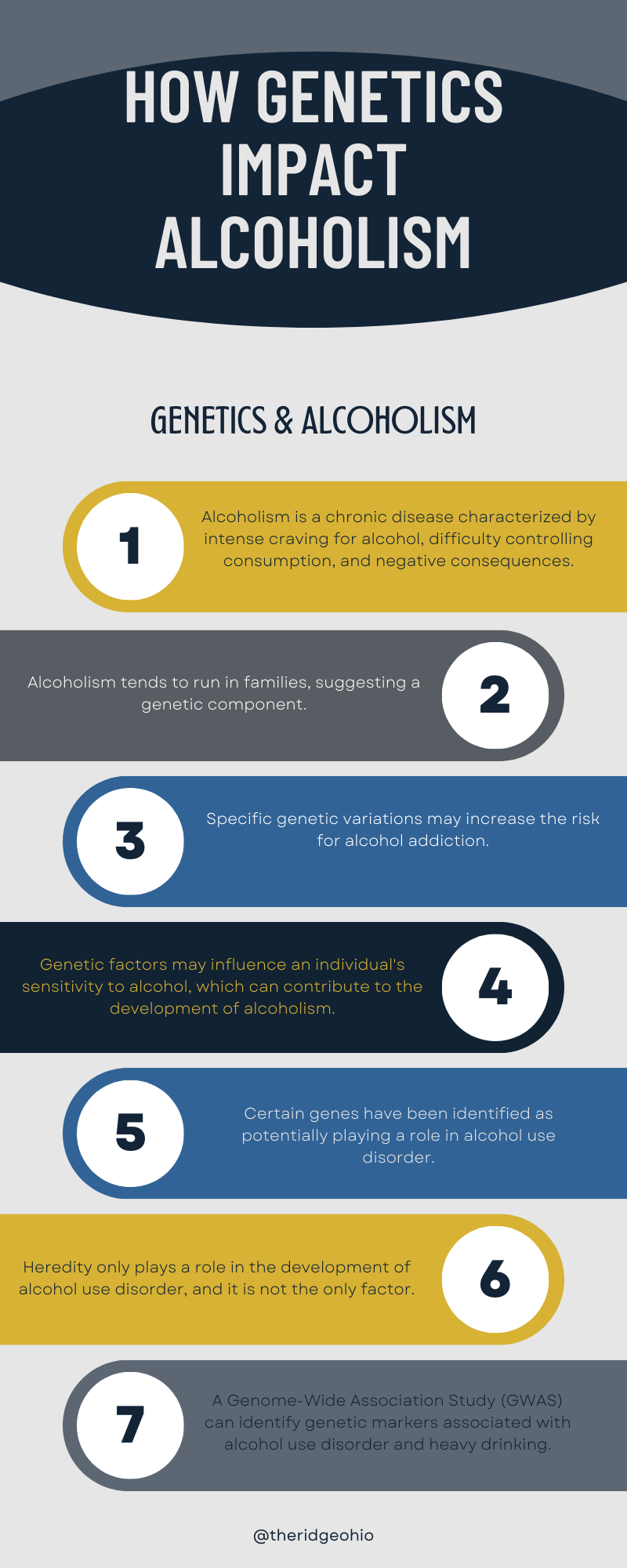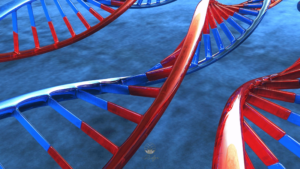Alcoholism, also known as alcohol addiction, is a chronic disease characterized by an intense craving for alcohol, difficulty controlling alcohol consumption, and negative consequences resulting from drinking. While various factors contribute to the development of alcoholism, including environmental and societal influences, genetics also play a significant role. Research has shown that alcoholism tends to run in families, suggesting that there is a genetic component to the disease. In addition, studies have found that individuals with a family history of alcoholism are more likely to develop alcoholism themselves. However, it’s essential to note that genetics does not determine whether or not a person will become an alcoholic; it may increase the risk.
What Is The Role of Genetics in Alcoholism?
There is a vast amount of medical research and evidence indicating that alcoholism is a complex genetic disease. This means that variations in a large number of genes affect an individual’s risk of developing alcoholism. While other factors, such as environmental and social influences, can contribute to the development of alcoholism, genetics plays a significant role in the disease.
It’s important to note that genetics is just one piece of the puzzle regarding alcoholism. Environmental and societal factors also play a significant role in developing this disease. For example, exposure to alcohol at an early age, a history of trauma or abuse, and stress can all increase the risk of alcoholism.
Which genes have the strongest known effects on risk for alcoholism?
Genes that affect and influence the development of alcoholism can be broken down into two notable categories including genes that affect metabolism and genes that influence the brain’s reward pathways.
Two genes of alcohol metabolism, ADH1B and ALDH2, have the strongest known effects on the risk for alcoholism. Variations in these genes can affect an individual’s sensitivity to the effects of alcohol and their risk of developing alcohol addiction. The ADH1B gene codes for the enzyme that metabolizes alcohol in the liver, while the ALDH2 gene codes for the enzyme that converts acetaldehyde, a toxic byproduct of alcohol metabolism, into a less toxic substance. Genetic variations in these genes can lead to different rates of alcohol metabolism, which can affect the risk of developing alcoholism.
Another gene studied with alcohol use disorder is the DRD2 gene, which plays a role in the brain’s reward pathway. Variations in this gene may also contribute to an increased risk for alcoholism. It is important to note that these are just a few examples of the many genes implicated in alcohol use disorder. The overall role of genetics in the development of the disease is complex and versatile. Still, it can factor into treatment and prevention.
How Do Genetics Influence Alcohol Use Disorder?
Heredity, or the genetic inheritance that is passed down from parents to children, can influence the risk for alcohol use disorder in several ways. For example, individuals who have a family history of alcoholism may be more likely to develop the disease themselves due to the presence of certain genetic variations that increase the risk. These genetic variations may be inherited from one or both parents. They can affect an individual’s sensitivity to alcohol, addiction risk, and treatment response.
Heredity only plays a role in the development of alcohol use disorder, and it is not the only factor. Environmental and societal factors, such as exposure to alcohol at an early age, a history of trauma or abuse, and stress, can also contribute to the development of the disease. In addition, understanding the interplay between genetics and other risk factors can help inform treatment and prevention efforts.
Is there a link between genetics and alcohol use disorder?
Research scientists and medical professionals agree that a variety of factors play a role in the development of alcohol use disorder (AUD). That’s the contemporary term for the medical condition most people think of as alcoholism. Although healthy debate continues in research and scientific communities, most scientists now understand that a combination of environmental and genetic factors accounts for most cases of AUD. This current state of knowledge represents a reconciliation, of sorts, between the two sides of the nature vs. nurture debate. In that debate, nature means genetics, and nurture means environment.
Research shows alcohol use disorder (AUD) is not caused by one or the other. It’s the result of a combination of the two. Genetic factors that predispose an individual to AUD exist. Environmental factors that increase the likelihood of AUD also exist. It’s possible to develop problem drinking when one factor is present and the other isn’t. It’s also possible to develop AUD when neither is present. However, when one or both risk factors are present, the likelihood of developing AUD increases dramatically.
Despite the progress made in mapping the human genome and identifying genes associated with AUD, advances in our understanding of the genetic component of AUD have not had a significant impact on treatment for AUD. Effective treatment revolves around creating behavioral change through group and individual therapy, community support, and lifestyle modification. In addition, most evidence-based treatment now includes complementary approaches such as basic exercise, expressive therapies like art, writing, and music, and experiential therapies such as surfing, equine therapy, and mindfulness.
Researchers hope advances in genomics will lead to gene therapies that may reduce the risk for people with genes that predispose them to AUD. We’re not there yet, but a recent study conducted by the University of Pennsylvania School of Medicine indicates we’re getting closer.
A Genome-Wide Association Study (GWAS)
We’ll take a moment to cheerlead for science, now. Between 1990 and 2003, researchers at The National Institutes of Health mapped the entire human genome. If this article were a meme, we’d say let than sink in.
Genes are the blueprint for all organic life on earth. The fact that we mapped the entire human genome means that we have, at our fingertips, the entire blueprint for a human being. That’s an awe-inspiring accomplishment.
For a quick refresher on genes and DNA, click here.
Knowledge of the human genome allows scientists to compare the genes of people with specific diseases against people without those diseases. That helps them identify which genes are associated with each disease. That’s what a GWAS is. First, scientists choose the disease they want to study. Next, they obtain DNA from people with and without the disease. Finally, they scan each set of DNA for the presence or absence of the related genetic markers. Researchers have used the process to pinpoint genes associated with type 2 diabetes, obesity, prostate cancer, some heart disorders, and Parkinson’s disease.
The Latest GWAS: Alcohol Consumption and Alcohol Use Disorder
The study at the University of Pennsylvania used the GWAS process to search for genetic markers associated with two conditions related to problem drinking: alcohol use disorder and heavy drinking. Here’s what they found:
- Heavy Drinking. Data showed 13 genetic variations associated with heavy alcohol consumption.
- Alcohol Use Disorder. Data showed 10 genetic variations associated with AUD. Seven of these had not been identified before the study.
- AUD and Heavy Drinking. Data showed five variations associated with AUD and heavy drinking.
The researchers then went further. They identified over one hundred diseases or conditions correlated with AUD, including decreased cognitive function, various psychiatric conditions, and insomnia. Study author Henry Kanzler, MD, interviewed in Science Daily, observed:
“Focusing on variants only linked to AUD may help identify people at risk and find targets for the development of medications to treat it. The same applies to alcohol consumption. Those variants could inform interventions to help reduce consumption in heavy drinkers, who face their own set of adverse effects.”
There are generally two goals for studies like these: first, identifying people at-risk, and second, developing therapies for the disease in question. This study is the same. The first goal is to help identify people who may be at risk of developing AUD. The second is to develop gene therapies for people with AUD. This study successfully accomplishes the first goal, but the second may be years away. In order to make progress, we have to proceed in a responsible, stepwise fashion – and research like this is the first step.
Why This Study Matters – Genetics and Alcohol Use Disorder
New research often gets lots of hype for showing promising results. It’s easy to see this in headlines that tout amazing developments or groundbreaking discoveries or game-changing data. However, upon closer inspection, many stories found in the media prove to exaggerate the research reported in the studies themselves. The stories may be based on preliminary letters published before peer review, studies that assess correlation rather than causation, or studies with small sample sizes.
The first reason this new study is significant is because of the sheer numbers involved. Researchers used data from the Million Veteran Program (MVP). The MVP is a large-scale, long-term project conducted by the Department of Veterans Affairs. While many studies base conclusions on sample sets as small as thirty participants, this study included genetic data from almost two-hundred seventy-five thousand people. The sample set included over fifty-thousand African Americans, a group often underrepresented in medical research.
That’s the second reason this study matters: diversity. Advances in genetics allow us to see – at the most basic level – things that we all have in common. When researchers combine these advances with the awareness that alcohol use disorder (AUD) and heavy drinking affect everyone, they design studies to include sample sets that resemble the makeup of our population. This is one of those studies. We can use this data to draw useful conclusions that expand our understanding of the genetic components of AUD. This new addition to our collective knowledge base will, in the long run, help all people who seek treatment for heavy drinking or alcohol use disorder.
Implications for Treatment and Prevention
Understanding the role of genetics in alcoholism can have important implications for treatment and prevention efforts. For example, targeted treatment approaches that consider an individual’s genetic profile may be more effective at helping them overcome their addiction. In addition, understanding the genetic factors that contribute to the risk of alcoholism can inform prevention efforts. Such as identifying at-risk individuals and providing them with the necessary resources and support to prevent the development of this disease.
Final Thoughts On Genetics And Alcohol Use Disorder
In summary, genetics plays a significant role in the development of alcoholism. While environmental and societal factors also contribute to the disease, understanding the genetic factors that increase the risk of alcoholism can inform both treatment and prevention efforts. It is essential to acknowledge the role of genetics in addiction and to consider this information when developing approaches to help individuals overcome their addiction and prevent the development of the disease in others. If you or a loved one is struggling with alcohol use disorder, please seek help from a healthcare professional or a substance abuse treatment program. The Ridge Ohio is here to help. Contact us at 513-457-7963 to talk to someone today.
References:
- Howard J. Edenberg*† and Tatiana Foroud†. Are there genetic influences on addiction: evidence from family, adoption and twin studies. Addiction. 2008;103(7):1069-1081. doi: https://www.ncbi.nlm.nih.gov/pmc/articles/PMC4056340/
- Wang Q, Shen H, Li X, Zhang L, Zhang C, Li Y. Alcohol-related genes and alcohol dependence. Front Neurosci. 2019;13:292. doi: 10.3389/fnins.2019.00292
- Penn Medicine. Genes linked to alcoholism? Scientists find new clues. ScienceDaily. Published April 2, 2019. Accessed February 21, 2023. https://www.sciencedaily.com/releases/2019/04/190402124314.htm
- Nature Education. Genetics. Nature. Accessed February 21, 2023. https://www.nature.com/scitable/topic/genetics-5/
- Park BL, Kim JW, Cheong HS, et al. Comprehensive genetic study of Korean alcohol dependence patients with genome-wide association and epistasis analyses. PLoS One. 2013;8(11):e80999. doi: 10.1371/journal.pone.0080999



